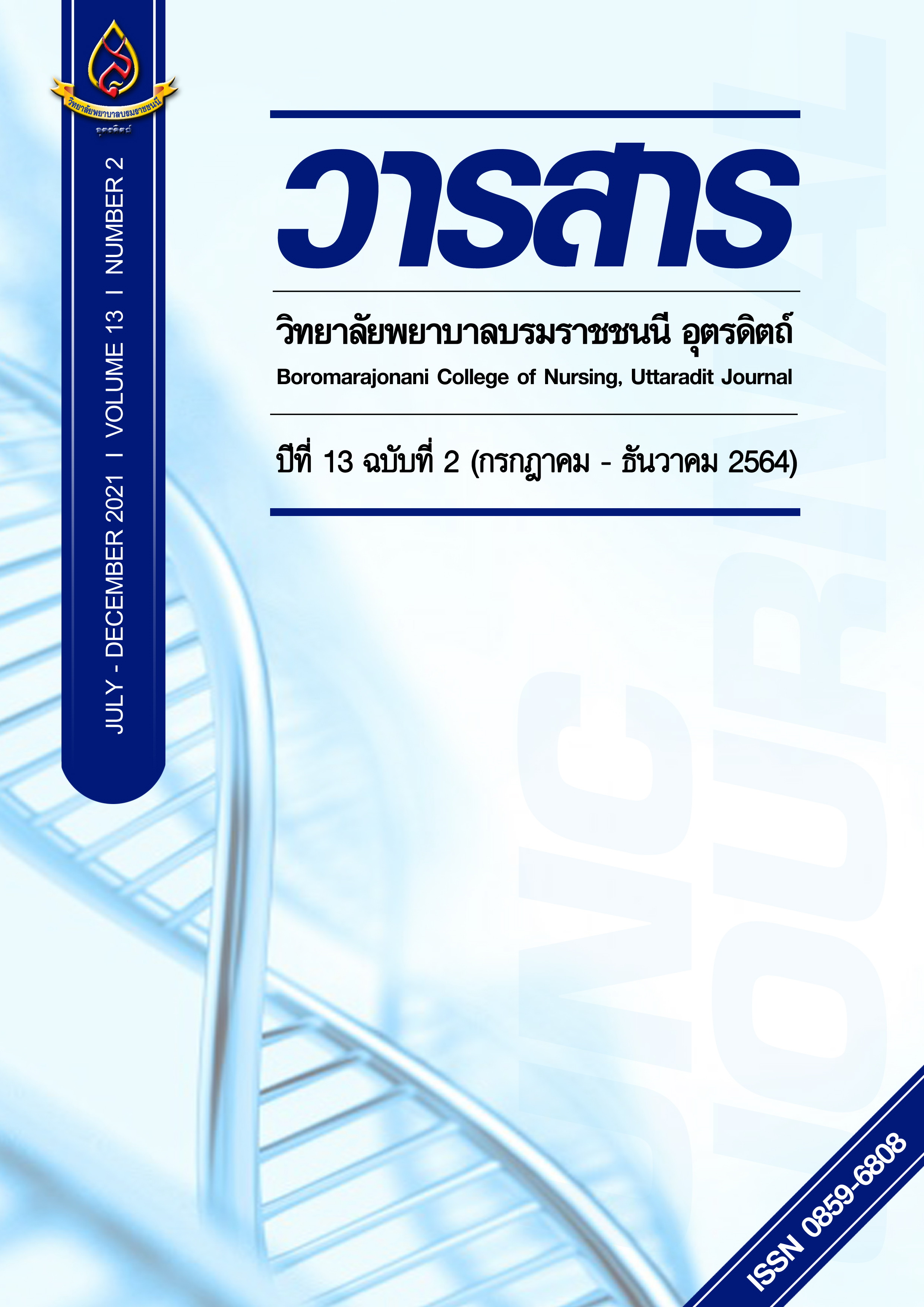ผลของโปรแกรมการเรียนรู้แบบมีส่วนร่วมต่อพฤติกรรมการส่งเสริมสุขภาพของผู้สูงอายุ ชุมชน ตำบลบ้านสวน อำเภอเมือง จังหวัดชลบุรี
Main Article Content
บทคัดย่อ
การวิจัยครั้งนี้เป็นการวิจัยกึ่งทดลองแบบสองกลุ่มวัดผลก่อนและหลังการทดลอง โดยมีวัตถุประสงค์เพื่อศึกษาผลของโปรแกรมการเรียนรู้แบบมีส่วนร่วมต่อพฤติกรรมการส่งเสริมสุขภาพ กลุ่มตัวอย่างเป็นผู้สูงอายุ จำนวน 60 คน แบ่งออกเป็นกลุ่มทดลองและกลุ่มควบคุม กลุ่มละ 30 คน เครื่องมือที่ใช้ในการวิจัยประกอบด้วย โปรแกรมการเรียนรู้แบบมีส่วนร่วม แบบสอบถามข้อมูลส่วนบุคคล แบบประเมินพฤติกรรมการส่งเสริมสุขภาพ ประกอบด้วย 6 ด้าน คือ ด้านความรับผิดชอบต่อสุขภาพ ด้านกิจกรรมการออกกำลังกาย ด้านโภชนาการ ด้านสัมพันธภาพระหว่างบุคคล ด้านความเจริญทางจิตวิญญาณและด้านการจัดการความเครียด มีค่าความเชื่อมั่น .83 ดำเนินการทดลองระยะเวลา 6 สัปดาห์ และติดตามผลระยะเวลา 1 เดือน วิเคราะห์ข้อมูลด้วยสถิติเชิงพรรณนาและสถิติเพื่อการเปรียบเทียบ (independent t-test, repeated measure ANOVA)
ผลการวิจัย พบว่า หลังสิ้นสุดการทดลองและระยะติดตามผล กลุ่มทดลองมีคะแนนเฉลี่ยพฤติกรรมการส่งเสริมสุขภาพสูงกว่าก่อนการทดลอง อย่างมีนัยสำคัญทางสถิติที่ระดับ .05 และกลุ่มทดลองมีคะแนนเฉลี่ยพฤติกรรมการส่งเสริมสุขภาพสูงกว่ากลุ่มควบคุม อย่างมีนัยสำคัญทางสถิติที่ระดับ .05 ดังนั้นบุคลากรสุขภาพควรนำแนวคิดการเรียนรู้แบบมีส่วนร่วมไปใช้ในการจัดกิจกรรมสำหรับผู้สูงอายุและควรมีการจัดอย่างต่อเนื่องเพื่อให้ผู้สูงอายุมีความเชื่อและพฤติกรรมส่งเสริมสุขภาพที่เหมาะสมในระยะยาว
Article Details
บทความหรือข้อคิดเห็นใดใดที่ปรากฏในวารสารวิจัยการพยาบาลและวิทยาศาสตร์สุขภาพ เป็นวรรณกรรมของผู้เขียน ซึ่งบรรณาธิการหรือสมาคมศิษย์เก่า ไม่จำเป็นต้องเห็นด้วย และบทความที่ได้รับการตีพิมพ์เผยแพร่ถือเป็นลิขสิทธิ์ของวารสารวิจัยการพยาบาลและวิทยาศาสตร์สุขภาพ
เอกสารอ้างอิง
Armartmuntee, T., Kankarn, W. & Mongthaweepongsa S. (2018). Cost-effectiveness of sufficiency health promotion program in elders with chronic disease in semi-ubran, Yasothorn province. Journal of Nursing and Health Care, 36(1), 100-108. (in Thai).
Bautong, S., Sapapat, S. & Jitjarat, S. (2018). Ageing related to reason method and needs of learning. Journal of education silpakorn university, 12(2), 6-16. (in Thai).
Booncharean T. (2010). The health promotion and quality of life model development of older adults in Nakhon Sawan province. Naresuan University Journal, 18(1), 95-101. (in Thai).
Boukeaw, P. & Teungfung, R. (2016). Health care and health status of Thai aging. Journal of the Association of Researcher. 21(2), 94-108. (in Thai).
Choowong, J., Kongsakul, P. (2012). Effects of participatory learning on knowledge of hypertension and food consumption of hypertensive elderly patients in elderly club of Amphur Muang, Trang provice. Journal of Health Science Research, 6(2), 30-37. (in Thai).
Cohen, J. (1988). Statistical power analysis for the behavioral sciences. Hillsdale, NJ: Lawrence Erlbaum Associates.
Danyuthasilpe C. (2018). Pender’s health promotion model and its applications in nursing practice. Songklanagarind Journal of nursing, 38(2), 132-141. (in Thai).
Kolb, D. A. (2015). Experiential learning: experience as the source of learning and development. 2rd ed. USA: Pearson Education. Inc.
Manorath P., Kamfong K.,Waengnork W. & Nitirat P. (2016). Self-health care of the buddhist elderly in suburban area: a case study Ban Na-Plong, tambon Tha-Sao, amphur Muang, Uttaradit Province. Boromarajonani College of Nursing, Uttaradit Journal, 8(2), 96-111. (in Thai).
Pender N.J., Murdaugh C.L., & Parson M.A. (2006). Health promotion in nursing practice. 4th ed. Upper Saddle River, N.J.: Prentia Hall.
Porsing S., & Harnsakul, A. (2019). Effectiveness of learning programs knowledge and self-care behaviors in participatory learning to elderly’s Kongbuakhok sub-district, Chatturat district, Chaiyaphum province. Journal of The Office of DPC 6 Khon Kaen, 19(1), 39-53. (in Thai).
Romprasert, S. (2014). Articles old age: the age and readiness of the Thai government. Journal of Economics and Public Policy, 5(10), 16-25. (in Thai).
Rungpichayapichet, P. & Chotyakul, N. (2018). Application of participatory learning process for classroom chatting reduction. Panyapiwat Journal, 10, 242-251. (in Thai).
Sakcharoen, P. (2015). Adult learning theory and self-directed learning concept: learning process for promoting lifelong learning. Journal of The Royal Thai Army Nurses, 16(1), 9-13. (in Thai).
Srisong, R. Mahaweerawat, U., & Tangpaisan, P. (2012). The effects of group process application on health behaviors of the elders in elderly clubs in Nong Bua Sub-District, Archsamart district, Roi Et Province. Journal of Social Science for Local Rajabhat Mahasarakham University,6(2),179-185. (in Thai).
Tasuwan-int, T. (2016). Fall in elderly. UBRU Journal for Public Health Research, 5(2), 119-131. (in Thai).
Thinhanwong, S. (2018). Participatory learning: from theory to practice in children’s literature course. Journal of Humanities & Social Review, 17(1),1-11. (in Thai).
Trakulsithichoke, S. (2018). Prevention of dementia in older persons. Journal of Nursing and Health Care, 36(4), 6-14. (in Thai).
Waichompu, N., Boontud, R., & Singweratham, N. (2019). Elderly health promotion by three main concepts. The Southern College Network Journal of Nursing and Public Health, 6(2), 262-269. (in Thai).


